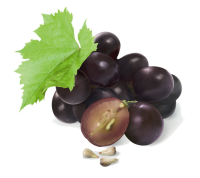Grape Seed
 Overview
Overview
Grape seed extract, or Vitis vinifera, is currently used in traditional medical treatments for many different conditions, including those related to the heart and blood vessels, high blood pressure, high cholesterol and poor circulation. Other treatments include vision problems and macular degeneration, swelling after surgery, wound healing and cancer prevention.
The extract is available in capsule and tablet forms.
History of Grape Seed
French explorer Jacques Cartier was leading an expedition up the Saint Lawrence River in 1534 when he and his team were trapped by ice. The men were forced to survive on salted meat and biscuits and began to develop scurvy, which is caused by a severe vitamin D deficiency. A native American Indian came upon the crew and told them to drink a tea made from the bark and needles of pine trees. Because of this, Cartier and his men survived.
Over 400 years later, a professor at the University of Bordeaux in France (Jacques Masquelier) read Cartier’s book and concluded the pine bark contained vitamin C, as well as bioflavonoids, which exert vitamin C-like effects.
Grape Seed Constituents
The pine bark mentioned above (as well as grape seeds) contains active components which were first called pycno-genols. The term is used to describe an entire spectrum of proantho-cyanidin complexes found in plants including lemon tree bark, pine bark, grape seeds, peanuts, cranberries, and citrus peel. The current terms for these compounds are proanthocyanidins, oligomeric proanthocyanidin complexes (OPCs), or procyanidolic oligomers (PCOs).
Masquelier patented his method for extracting PCO from pine bark in 1951 and from grape seeds in 1971. PCOs exist in many plants and in red wine.
Pine bark and grape seed PCOs are well defined chemically. Grape seed extracts contain 92 to 95 percent PCOs, while extracts from pine bark can vary from 80 to 85 percent. In France, grape seed extracts outsell pine bark sales. However, largely due to aggressive advertising, pine bark extract sales in the U.S. outsell grape seed PCO sales.
Grape Seed Health Benefits
PCO extracts demonstrate a wide range of pharmacological activity, including the ability to increase intercellular vitamin C levels, scavenge antioxidants and free radicals, decrease capillary permeability and fragility, and inhibit the destruction of collagen. Collagen is the most abundant protein in the body and is responsible for helping to maintain the integrity of “ground substance,” as well as that of cartilage, tendons and ligaments. PCO extracts cross-link collagen fibers, resulting in reinforcement of the natural cross-linking of collagen that forms the collagen matrix of connective tissues. PCO extracts also prevent the release and synthesis of compounds which promote inflammation and allergies, such as serine proteases, histamine, prostaglandins and leukotrienes.
Collagen also supports blood vessels and dermis.
Damage from free radicals has been linked to the aging process and every chronic degenerative disease including cancer, arthritis and heart disease. Fats and cholesterol are particularly susceptible to free radical damage. When fats and cholesterol are damaged, they form toxic derivatives known as lipid peroxides and cholesterol epoxides.
Most individuals appear to benefit from an increased consumption of PCOs. A study investigating the ability of grape seed PCO extract to improve visual function in subjects who were healthy had very positive results. Over 100 volunteers with no retinal disorders took 200 milligrams per day of PCOs or a placebo for 5 to 6 weeks. A control group received no treatment whatsoever. The group receiving the PCOs showed significant improvement in visual performance after glare tests and in the dark when compared to the placebo group. The improvement was shown to be related to improved retinal function.
Sophisticated lab tests have shown that the use of PCOs in treating vascular conditions is highly beneficial. PCOs were able to:
- Trap hydroxyl free radicals
- Trap lipid peroxides and free radicals
- Delay the onset of lipid peroxidation
- Chelate to free iron molecules, thus preventing iron-induced lipid peroxidation
- Inhibit the damaging effects of enzymes which degrade connective system structures
- Inhibit production of free radicals by inhibiting xanthine oxidase
Research studies are now showing that the level of antioxidants may be of more significance than cholesterol levels in determining the risk for a patient to exhibit signs of heart disease. Antioxidants prevent the oxidation of cholesterol and its carrier proteins, as well as help to prevent the initial damage to the artery which aids in prevention of atherosclerosis. Other studies show antioxidants such as vitamin E, vitamin C, and beta carotene are capable of significantly reducing the risk of dying from stroke or heart attack.
Doses
No matter what the source, PCO extract may be used to promote good health. For preventative measures and antioxidant support, a daily dose of 50 milligrams of either pine bark or grape seed extract is recommended. A typical daily intake of total flavonoids is about 25 milligrams. Therefore, an intake of 30 milligrams is suggested to significantly reduce the risk for cardiovascular mortality.
When PCO extracts are used for therapeutic reasons, the daily dose can be increased to 150 to 300 milligrams.
Bound PCOs exert much greater antioxidant effects than unbound PCOs.
Adverse Reactions
Grape seed extract is typically well tolerated when it is taken orally. Side effects can include dry, itchy scalp; dizziness; headache; hives; nausea; indigestion; and high blood pressure.
Interactions between grape seed extract and other medications have not been fully documented. Always tell a health care practitioner about any medications and supplements which are being taken on a regular basis.
References
- Bone, K. A Clinical Guide to Blending Liquid Herbs: Herbal Formulations for the Individual Patient, Churchill Livingstone (2003)
- Braun, L. & Cohen, M. Herbs & Natural Supplements: An evidence-based guide, Elsevier (2005)
- Duke, J. The Green Pharmacy: Herbal remedies for common diseases and conditions from the world's foremost authority on healing herbs, Rodale Limited (2003)
- Kowalchik, C. & Hylton, W. Rodale's Illustrated Encyclopedia of Herbs, Schwartz Books (1987)
Posted in Grape Seed
Ask a Question Or Join a Discussion


